| Srl | Item |
| 1 |
ID:
013770


|
|
|
|
|
| Publication |
Aug 1992.
|
| Description |
31-37
|
|
|
|
|
|
|
|
|
|
|
|
|
|
|
|
| 2 |
ID:
174486
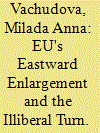

|
|
|
|
|
| Summary/Abstract |
What keeps European states committed to the EU project has not changed: it is economically much better to be inside the bloc than outside.
|
|
|
|
|
|
|
|
|
|
|
|
|
|
|
|
| 3 |
ID:
151846
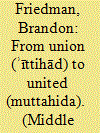

|
|
|
|
|
| Summary/Abstract |
The United Arab Emirates (UAE) was the result of more than three years of failed negotiations to unify the nine pre-state shaykhdoms. Thus, the formation of the UAE may be viewed as a success born of failure. In the period following the 1968 British announcement, the political events that led to the formation of the modern state of the UAE were largely a product of the competition for power or protection between the rulers of the nine pre-state shaykhdoms. This article explains how the personal rivalries and historical animosities between the ruling shaykhs manifested themselves and shaped events that led to the formation of the UAE in 1971.
|
|
|
|
|
|
|
|
|
|
|
|
|
|
|
|
| 4 |
ID:
092869
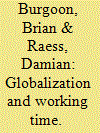

|
|
|
|
|
| Publication |
2009.
|
| Summary/Abstract |
This article challenges popular wisdom that economic globalization uniformly increases working time in industrialized countries. International investment and trade, they argue, have uneven effects for workplace bargaining over standard hours and over work-time flexibility, such as use of temporary or fixed work contracts. The authors explain how such globalization will tend to more substantially decrease standard hours than it does work-time flexibility. And they explain how works councils and union-led collective bargaining alter the way globalization affects both aspects of working time.The analysis of German enterprise data supports these expectations. Measures of globalization diminish standard working hours but yield more temporary work, fixed-contract work, and flexible working arrangements. Works councils and collective bargaining, however, mediate these effects in contrasting ways. Among enterprises without works councils or collective agreements globalization triggers more standard hours, but among firms with such representation globalization triggers fewer hours. With respect to flexibility, however, globalization increases use of temporary or fixed-term contracts more strongly where works councils or collective bargaining are present than when they are not. In short, economic openness has uneven consequences for working time, and firm-level labor representation channels those consequences in ways that highlight political agency in how people respond to globalization.
|
|
|
|
|
|
|
|
|
|
|
|
|
|
|
|
| 5 |
ID:
082680
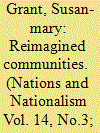

|
|
|
| 6 |
ID:
161827


|
|
|
|
|
| Summary/Abstract |
Using the data from an original survey on rural migrant workers from Suzhou industrial sector in 2013, we estimate the wage effect of both union membership and union coverage across the wage distributions using decomposition approach based on unconditional quantile regression. The results show that union membership has a significant effect on the wage level of rural migrant workers across the wage distribution. The effect of coefficient differences which results from the different rewarding systems explains the majority wage differentials between union members and non-members in non-unionized firms. There is also significant union coverage effect at the lower part of the distribution when comparing the union-covered non-member to the nonunion-covered non-member, which is also mainly caused by the coefficient effect. By contrast, wage differentials between union members and non-members in unionized firms are attributed to significant composition effect, which reveals that union members are positively selected within unionized firms. As a result, the positive wage effect of union is limited to the more advantaged group among migrant workers.
|
|
|
|
|
|
|
|
|
|
|
|
|
|
|
|
| 7 |
ID:
121051
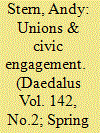

|
|
|
|
|
| Publication |
2013.
|
| Summary/Abstract |
American trade unions are a crucial segment of civil society that enriches our democracy. Union members are stewards of the public good, empowering the individual through collective action and solidarity. While union density has declined, the U.S. labor movement remains a substantial political and economic force. But the relentless attacks by the political right and its corporate allies could lead to an erosion of civic engagement, further economic inequality, and a political imbalance of power that can undermine society. The extreme assault on unions waged by Republicans in Wisconsin, Ohio, Michigan, and at a national level must be countered by a revitalized labor movement and by those who understand that unions are positive civil actors who bring together individuals who alone have little power. Unions need both structural reform and greater boldness; there are moments in which direct action and dramatic militancy can bring about positive social change. The current assault on labor can be rebuffed, and unions can expand their role as stewards for the public good and as defenders of efforts by the 99 percent to reduce inequality and protect democracy.
|
|
|
|
|
|
|
|
|
|
|
|
|
|
|
|
| 8 |
ID:
174485


|
|
|
|
|
| Summary/Abstract |
European democracy has always been playing catch-up with popular aspirations for democratic representation.
|
|
|
|
|
|
|
|
|
|
|
|
|
|
|
|